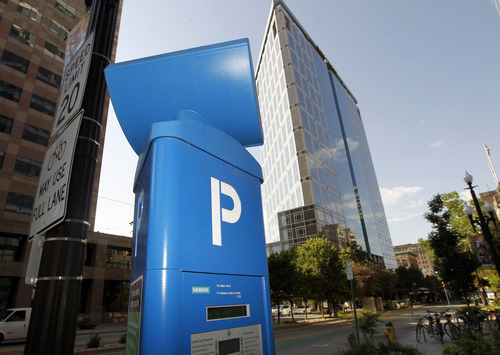This is an archived article that was published on sltrib.com in 2014, and information in the article may be outdated. It is provided only for personal research purposes and may not be reprinted.
After two years of hassling with its Aparc Systems blue parking kiosks, Juneau, Alaska, has canceled its contract and has filed a lawsuit against the company.
"The system never worked for us," Juneau Mayor Merrill Sanford said Wednesday. "We didn't get what we paid for."
The Juneau system is similar to the one Salt Lake City bought from Aparc for $4.5 million two years ago. Utah's capital replaced 2,100 coin-operated meters with 344 solar-powered pay stations — and continues to work to refine the system that has been plagued by glitches.
The Alaskan capital, with a population of 32,000, bought Aparc Systems for its downtown core, the mayor explained. Like Salt Lake City (population 190,000), Juneau replaced its coin-operated meters in hopes of offering its residents and visitors a host of advantages.
A major issue for Juneau, the mayor explained, is that data from the kiosks did not get to parking-enforcement personnel with hand-held computers in an accurate and timely fashion.
"Our community service officers couldn't write tickets," he said, "because they didn't have accurate information."
Beyond that, motorists complained about the kiosks, he said. "There was a lot of frustration with things that were supposed to be possible with the system."
Aparc Systems, based in Vancouver, B.C., did not respond to a request for comment Wednesday.
Many Salt Lakers find the blue kiosks easy to use, said City Councilman Stan Penfold during a council work session Tuesday.
But other council members said the system remains fraught with problems well into its second year of service. Complaints include unlighted keypads, periodic refusal of credit cards, overheating and, like Juneau, bugs in the computer system that relays kiosk information to enforcement officers.
"The criticisms are all totally fair," Councilman Kyle LaMalfa said in an interview. "You would think in this day and age you could come up with something better."
But LaMalfa added that the administration of Mayor Ralph Becker should not be criticized for selecting Aparc. The system, picked through a competitive process, was represented to be a technological advancement that would bring parking into a new era.
"It had a wide range of technological features," he said. "And we had to change from the old coin meters."
David Everitt, Becker's chief of staff, conceded to the council that the system had not lived up to its potential. "We are not satisfied with the performance," he said. "We have withheld some payments to Aparc based on performance."
No further details were available Wednesday on those payments.
Nonetheless, the city will continue to work with Aparc to fix shortcomings, he said.
In response to Council Chairman Charlie Luke, who asked whether Salt Lake City was stuck with the system, Everitt said, "There is always legal recourse, but we don't want to use that option. We have a lot of people spending a lot of time on this [to resolve issues]."
In an interview, Councilwoman Lisa Adams said it's time to re-evaluate the system.
"We have ongoing problems," she said. "I really think it's pressing for us to find out if we were sold a poor product."
Although it has glitches, the system is not a failure, said Becker spokesman Art Raymond. Usage of the meters remains steady, he said.
Revenue projections are off by an estimated $1.2 million to $1.5 million again this year. But most of the shortfall — $900,000 — is from uncollected citation fines, Raymond said. The administration has added personnel to increase those collections.
Projections of revenue from the parking meters, themselves, is about $270,000 lower than expected, he said.
Nonetheless, according to parking statistics, overall revenues are up $1.2 million per year since the old meters were replaced.



